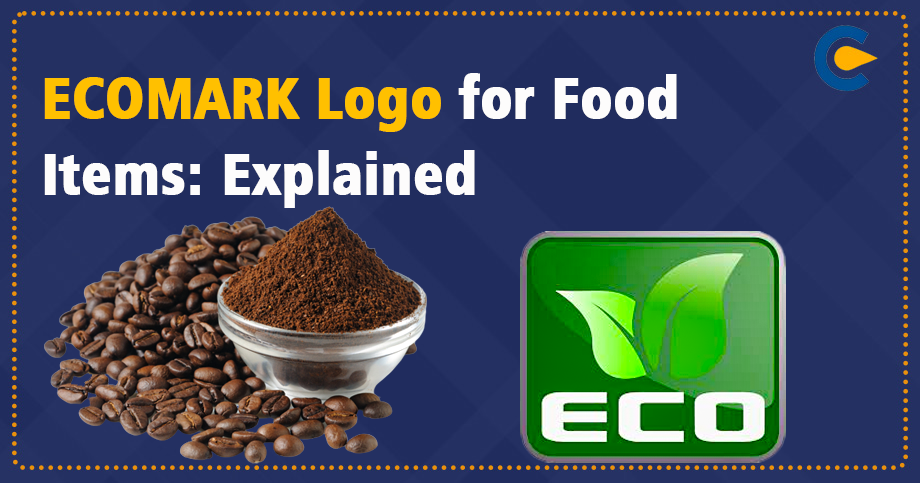ECOMARK refers to a certification mark accorded by the BIS (Bureau of Indian Standards), an apex government institution. Products under ECOMARK ensure that the BIS norms have been followed and hence pose no risk to the environment or the end users. The marking scheme came into existence in 1991. The ultimate objective of ECOMARK is to amplify awareness among the masses towards minimizing environmental impact. The mark applies to several product categories such as paper, food items, electronic goods, cosmetics, leather, plastic, propellants, etc. in this write-up, we will elaborate on the role of the ECOMARK logo for food items in India.
Food items covered under the ECOMARK Logo scheme
Following are some food items covered under the ECOMARK Logo Scheme:
- Edible oils
- Coffee
- Tea
General norms around Food items falling under the ECOMARK logo scheme
The ECOMARK Logo is mandatory for food articles like edible oil, tea, and coffee. Let us go through the general norms outlined by BIS for these food items.
- All formulations of edible oils, coffee, and tea shall fulfil the underlying norms of BIS concerning quality.
- The product manufacturers are bound to share pollution NOC and authorization under the Environment (Protection) Act, 1986, with BIS while applying for the ECOMARK logo. The applied products should adhere to the guidelines of the Prevention of Food Adulteration Act 1954 and the rules outlined therein.
- The vanaspati manufacturer must adhere to the norms outlined under Vegetable Oil Products Control Order 1975.
- The product should indicate a list of key ingredients in chronological order of quantity (primarily from higher to lower). The quantity should be displayed in standard units like C/o. W/W, or V/V. The list of ingredients should not fall outside the scope of BIS guidelines.
- The product label must explicitly signify the criteria for labelling the product as environmentally friendly.
- The packaging material should be recyclable and biodegradable.
Documents to be provided by the applicant for ECOMARK Logo for Food Items
Following are some basic documents required for ECOMARK Logo for Food Items:
- Business Registration
- Factory License
- BIS Testing Report
- FSSAI License
- List of equipment and machinery available at the facility
- Flowchart of the production process
- Details of standards being followed to maintain hygiene
- Quality Standard Certification (if any)
- Details of raw material suppliers
Step-by-step process to secure the ECOMARK logo for food items
Following is the step-by-step process to obtain the ECOMARK logo for food items
- Visit the BIS portal to file prescribed application forms. Common documents to be submitted during online filing include facility registration, address and name of the owners, FSSAI license, list of machines available, a flowchart of the production process, and so on and so forth.
- Once the BIS considers the application, the on-site vetting will be performed by the designated officials. The inspector may collect some product samples for testing.
- A sample will be tested at the BIS-certified labs.
- Collect the test report from the lab and share it with the BIS.
- Upon successful vetting of the documents and test report, BIS will grant its approval for the use of the Eco mark logo.
Norms around the Raw and Refined Edible Vegetable Oil
- The manufacturers cannot use aflatoxin in excess of 5 ppb in the production of raw and refined vegetable oil.
- The concentration of pesticide residue shall not surpass the threshold as outlined by the Food Safety and Standards Act, 2006
- The toxic metal concentration should adhere to the given limits:
- Toxic Metals Concentrations Lead 5.0 ppm
- Arsenic 0.5 ppm
- Mercury 0.25 ppm
- Cadmium 1.0 ppm
- Antioxidant quantity shall not surpass the limit outlined under the Food Safety and Standards Act, 2006.
- Product label must reflect the shelf life.
Indian Standards Mandating the use of the ECOMARK logo for Food Items
Following are some Indian Standards (IS) mandating the use of the ECOMARK logo for Food Items:
| Indian Standard (IS) | Products requiring ECOMARK Scheme |
| IS 75:1973 Reaffirmed Year 2010: | Linseed oil, raw and refined |
| IS 542:1968 Reaffirmed Year 2009 | Coconut oil (second revision) |
| IS 435:1973 Reaffirmed Year 2010 | Castor oil (second revision) |
| IS 546:2014 | Mustard oil |
| IS 13680:1993 Reaffirmed Year 2010 | Imported rapeseed oil |
| IS 7375:1979 Reaffirmed Year 2009 | Salseed |
| IS 3490:1965 Reaffirmed Year 2009 | Nigerseed oil |
| IS 544:2014 | Groundnut oil (second revision) |
| IS 5637:1970, Reaffirmed Year 2009 | Watermelon seed oil |
| IS 4276: 2014 | Soyabean oil |
| IS 547:1968 Reaffirmed Year 2009 | Sesame oil |
| IS 3448: 2014 | Rice bran oil |
| IS 8361:2014 | Palmolein |
| IS 543:1968 Reaffirmed Year 2009 | Cottonseed oil (second revision) |
| IS 545:1984, Reaffirmed Year 2009 | Mahua oil |
| IS 3491:1965 Reaffirmed Year 2009 | Safflower oil |
| IS 8591:1980 Reaffirmed Year 2009 | Kokum fat |
| IS 11069:1984 Reaffirmed Year 2010 | Refined, bleached hydrogenated, Winterized and de-odorized Soyabean oil |
| IS 9231:1979 Reaffirmed Year 2009 | Mango kernel fat |
General Guidelines to be Followed by the Hydrogenated Vegetable Oil Manufacturers
Following are some guidelines to be followed by Hydrogenated Vegetable Oil Manufacturers:
- The manufacturers must limit the nickel concentration to around 0.5 parts per million.
- The hydrogenated vegetable oil should be free from harmful chemicals.
- The concentration of pesticide residue shall not surpass the threshold as outlined by the Food Safety and Standards Act, 2006[1]
- The toxic metal concentration should adhere to the given limits:
- Lead 5.0 ppm
- Arsenic 0.5 ppm
- Mercury 0.25 ppm
- Cadmium 1.0 ppm
- Antioxidant quantity shall not surpass the limit outlined under the Food Safety and Standards Act, 2006.
- The product label must reflect the shelf life.
Norms to be followed by Tea Manufacturers for Securing the ECOMARK logo
Following are some norms to be followed by Tea Manufacturers for obtaining the ECOMARK Logo:
- Tea products should be free from adulterants like grit, leaves of foreign plants, sand, and spent tea leaves.
- Products must adhere to their characteristic flavour and should be free from off-odour.
- Lead concentration should not surpass 6.5 ppm
- Products should not contain any colouring agent or extraneous flavour. However, the same is not true for exportable products, as manufacturers are allowed to add the same to a permissible limit outlined under the Food Safety and Standards Act, 2006.
- Products should not contain mould growth.
- The limit of pesticide residue(s) should not surpass the threshold mentioned in the Food Safety and Standards Act, 2006.
Directions for coffee manufacturers seeking ECOMARK logo for food items
Following are some important directions for Coffee Manufacturers to seek ECOMARK Logo for food items:
- Coffee beans should not contain infestation triggered by fungi, insects, and rodents.
- Products should be free from foreign materials such as stone, metallic pieces, strings, glass, dirt, etc.
- There should be no colouring or flavouring agents in the final products.
- Final coffee production should not contain rancidity and must adhere to its characteristic flavour.
- The use of adulterants like acorns, cereals, dandelions, and figs is prohibited.
- Products should not contain mould growth.
- The pesticide residues should not surpass the permissible limits as recommended by the Food Safety and Standards Act, 2006.
Indians Standards outlining the requirement of ECOMARK logo for Coffee Production
| Indian Standards (IS) | Product covered |
| IS 2791:1992 Reaffirmed 2009 | Soluble coffee powder with ECOMARK |
| IS 3581:1982 Reaffirmed 2012 | Grading for green coffee |
| IS 3077:1992 Reaffirmed 2011 | Roasted and ground coffee |
| IS 3802:1992 Reaffirmed 2009 | Roasted coffee chicory powder |
| IS 3309:1992 Reaffirmed 2009 | Soluble coffee chicory powder |
Conclusion
It is evident that the ECOMARK logo for food items is limited to a few products for the time being. However, the authority has the right to extend its scope whenever the need arises. Adhering to the BIS norms is mandatory for all domestic and foreign manufacturers in India. BIS has underpinned some severe penalties for non-compliance. So it would be prudent to stay in line with underlying norms and operate as per the authority’s directions.
Read our Article:Overview of ECO Mark Logo for Cosmetic Products in India










